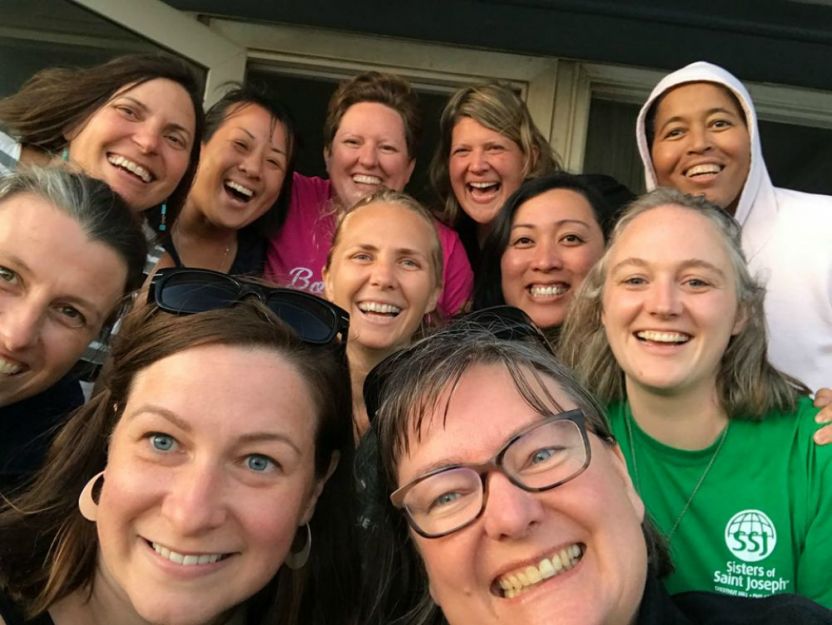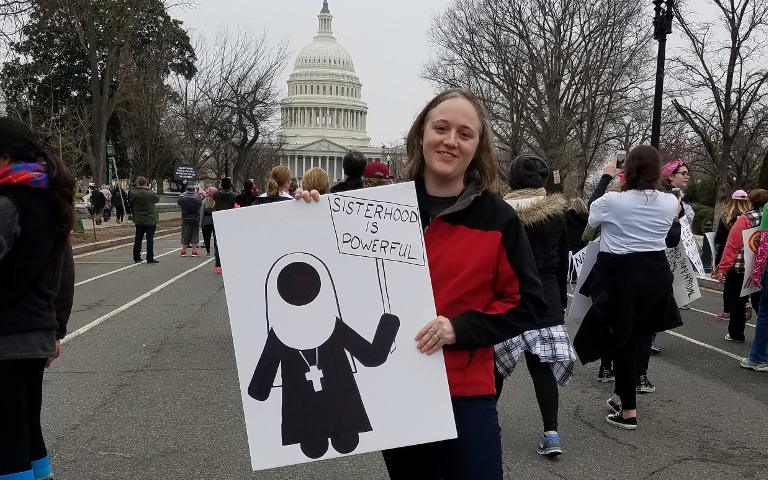
Sr. Colleen Gibson, right, in green, with other Sisters of St. Joseph (Provided photo)
In public places, I often struggle with how to introduce myself. Earlier in my religious life, I would tense up in meetings when we began the process of introductions. As my colleagues shared their names and positions, my internal dialogue persisted, "Should I say 'I'm Sister Colleen' or 'I'm Colleen, a Sister of Saint Joseph'?" By the time the cycle of introductions reached me, I made a selection, and however I introduced myself, the world (shockingly) did not come to a screeching halt.
Silly as it might seem (I'm sure no one was aware of my internal struggle), the titles that we use and how we name ourselves do matter. These names and titles indicate who we are and what we do. They reveal to those we meet something about ourselves and try as we may to have them remain neutral, they often carry with them the trapping of power, prestige and people's personal experiences.
With that in mind, I knew that placing "Sister" before my name would repel some and entice others. With students, sister was fitting, but with peers and colleagues, the answer seemed less clear. "Call me whatever you feel most comfortable with," I would tell folks.
Then last fall, a young woman I was studying with pulled me aside. "Can I call you Sister?" she asked somewhat sheepishly. "Of course!" I replied with joy, "Why do you ask?"
Apparently, she had heard that I didn't want to be called sister. Truthfully, in the classroom with my fellow students, I did prefer my first name sans title, but, as I told her affectionately, "I love being a sister," and with a smile added, "and I didn't give the last decade of my life so that you couldn't call me that." Instantly, she was at ease, grateful to have permission to call me what was most comfortable for her.
Advertisement
There is a reason, after all, that we are called "Sister." We are meant to be public witnesses to the One who has called us; to be sisters to all people as Jesus was brother to all whom he encountered. Our title is not meant to set us apart, it is meant to signify our call to union with God and with the people of God. It is when the title stands as a distinction that we need to be cautious, never confusing the importance and power of public witness with the temptation to distinguish ourselves from others, breaking the bonds of kinship established by our common baptismal call.
Without habits or the visual markers often associated with religious life, the title "Sister" is a tangible mark of the life we profess. As the International Union of Superiors General's synodal report, which is quoted in the "Working Document for the Continental Stage'' for the current synod on synodality, attests, "There is a tendency — in some churches — to exclude women … and even to undervalue religious life without the habit, without regard for the fundamental equality and dignity of all baptized Christian faithful." Mindful of this distinction, we must embody the gift of our sisterhood that is captured in the title we bear.
Recently, as I stood outside the parish where I recently began ministering, a mother came bounding up to me with her 12-year-old daughter in tow. Motioning to me, the mother exclaimed, "This is Sister Colleen, who I told you about!" Pausing for a moment, she continued, "Is she everything you thought she would be?"
Her daughter looked at me and then back at her mom.
"I thought she'd be in an outfit," she said, making a motion like a veil around her head, "And …" she continued slightly hesitant, "I thought she would be like 80."
Laughing out loud, I told the girl that I could understand her confusion. "This is what I wear — clothes just like everyone else. And I have a lot of gray hair but I'm certainly not 80." I said with a smile. "I'm just me, I hope that's OK!"
The girl and her mother smiled back gleefully. It seemed like that would be just fine.

Sr. Colleen Gibson poses near the Capitol in Washington, D.C., Jan. 21, 2017. (Submitted photo)
As I've eased into parish life, I've realized that this is a common reaction. In some ways, I am a conundrum. Most parishioners I meet either remember the sisters who taught them in pre-Vatican II habits or they have never actually met a sister in real life. This, it seems, is a big part of bearing public witness to religious life in the world today: being human and being present.
As the landscape of religious life continues to shift, and the number of vowed women religious in the United States continues its decadeslong trend of decline, active investment in and promotion of public witness is more important than ever. As the Center for Applied Research in the Apostolate (CARA) reported, in 2022, there were 36,321 women religious in the United States. Of these sisters, far more are over the age of 70 than under. (In 2020, the National Religious Retirement Office stated that "religious past age 70 outnumber religious under age 70 by nearly three to one," a figure which has undoubtedly increased in the intervening years.)
Of course, these figures are not new. They are the reality of religious life today. That is not to say there is no hope or that religious life has no future. I don't believe that, and I would imagine many, if not most or all, religious under 70 would agree. We wouldn't be here otherwise. Religious life will not zero out. The starkness of the figures concerning the number of women religious, however, does demand attention to the need for our public witness, especially in an age of declining numbers.
The question then is: how and where are we being called to witness?
There is no way that women religious can be everywhere we are needed or wanted or would desire to be. To try to do this would be to stretch our membership — our most crucial resource — far too thin. Great needs, though, demand generous and creative responses. Such generosity and creativity must come from both members and congregations. We must be generous in our sharing of ourselves with the world and we must preserve the joy and gift of our vocations by generously supporting one another in our efforts. This means doing the internal work to provide on-going formation and life-sustaining community, while also risking the effort to share the unique gifts of our lives, our prayer, and our persons with the larger world.
We must be generous in our sharing of ourselves with the world and we must preserve the joy and gift of our vocations by generously supporting one another in our efforts.
So often when we think of public witness, we think of the corporate voice of sisters in the world, our ability to join our voices to advocate for those in need and to underscore the gospel values we profess. This profession rings out in the statements we make and the ways in which religious congregations are able to maneuver their resources, both human and financial, in the service of pressing needs and critical causes.
Literally and figuratively, such collective action promises the greatest bang for our buck.
Harnessing the human resources of our sisters, with all their life experiences, longstanding relationships, prayerful engagement, and zeal for the Gospel is invaluable to the public witness women religious offer in the realm of advocacy. Be it through in-person advocacy and online petitions or public protests and workshops for ongoing education, women religious have the ability to wager their interpersonal capital to work for change and witness to the values at the heart of religious life. Joining together with sisters across congregations and people of faith from various institutions and organizations, such efforts do what no one member could do on their own and, in turn, showcases a vision and a voice that can inspire change and call for action — on personal, communal, and governmental levels — in our world.
So, too, do diversified forms of impact investing by women religious have the capability of showcasing our ability to leverage congregational capital and investment for the common good. Ranging from membership on corporate boards to low interest loans, such a public witness puts Catholic social teaching into action in a particular way and provides a model for other faith-based organizations and institutions to follow.
Still, while collective advocacy and investing provide a means of public witness on a corporate level, the power of relationships on a personal level is irreplaceable. This is how people come to know us and how we can continue to broaden our view of the gospel at work in the world. We simply cannot keep to ourselves. Freeing ourselves to answer how and where we need to be is critical at this moment. We are called "Sister" and we must be sisters to all. To be anything else would be a betrayal of our vocation, a loss for the people of God, and a denial of the gifts we have to offer the world and our church.







